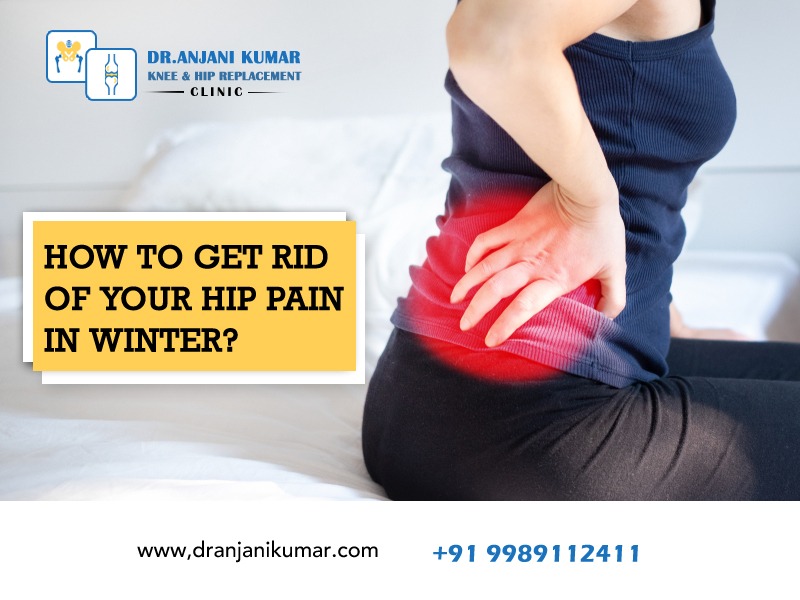After the monsoon, the atmospheric temperature starts dropping to freezing levels. Like other seasons, winters also have seasonal diseases, such as cold, flu, allergies, conjunctivitis, diarrhoea, and last but never least, hip pain.
Due to low temperatures, the tendons, muscles and bones expand a bit. As a result, the tissues stretch around the joint. This annoys the nerve endings, which causes pain and this pain limits motion. People living near bone-freezing cold climates should prepare themselves before winter starts.

Safeguarding from hip pain:
- Retaining warmth: During winter, providing warmth to the hip can give relief. Wearing multi-layered clothes, locks the heat inside the body, especially around the hip.
- Ice and hot pack: Ice pack helps reduce inflammation in the joints and reduces pain. A cool temperature reduces the rate of chemical reactions caused by inflammation and positively reduces inflammation. Five times a day, wrap an ice pack with a towel and apply it to your hip for 20 minutes. When a hot pack is used near the affected area of the hip, it improves blood circulation. Raising the temperature of the affected area even reduces discomfort and increases flexibility, soothes muscles and heals the damaged tissues.
The two types of heat therapies which helps in reducing hip pain:
- Dry heat (conducted heat): For instance, heating pads, and dry heating packs, are easy to apply for pain relief.
- Moist heat (convection heat): Moist heat sources include steamed towels, moist heating packs, or hot baths. Moist heat is moderately effective and requires less application time.
- Exercises: Regular exercises strengthen the muscles, increase motion and help in reducing hip pain. If you are already suffering from hip pain, then it’s time for you to slightly modify your daily routine exercises, which creates less stress on the hip. For instance, walking treadmill and yoga should be included in your daily routine. Slow controlled activity movements for about 20 to 30 minutes daily are the best solution to relieve hip pain.

- Compression: After applying an ice pack to your hip, wrap your hip and pelvis with a compression bandage. It helps the damaged muscles to recover faster by increasing blood circulation. Compression is typically recommended for acute pain caused by injury, but sometimes doctors prescribe it for hip pain.
- Doing stretching exercises: There are many specified stretching exercises for treating hip pain, as recommended by your physiotherapist. A gentle practice to stretch the hip muscles without aggravating the joint often involves kneeling or squatting. If you cannot practise these exercises due to other health problems, your doctor may recommend simple exercises for your knees and feet. Stretches are best for those with hip pain from bursitis.
- Losing weight: If you suffer from hip pain without any injury or other health issues, it is due to being overweight. Eating a balanced diet by drinking plenty of water, doing light aerobic exercises, and walking every day can help reduce weight.
- Maintaining hydration: Staying hydrated plays a vital role during winter. Dry cold air makes you feel dehydrated, tired and aching. If you don’t prefer drinking plain water, then sip a cup of warm tea and bone broth, and you can also take soup to keep hydrated. One should maintain the count of eight glasses of water per day. It would be best if you pay attention to your daily water intake.
- Eating a healthy and balanced diet: Please follow a balanced diet during winter to overcome hip pain. For instance, healthy food like vegetables and lean meat should be included, whereas processed sugars and carbohydrates should be avoided. Vitamins and minerals should also be incorporated into your healthy diet. It also keeps a check on your weight.
- Taking supplements: During winter, anti-inflammatory medications should be taken as prescribed by your doctor. Supplements such as vitamin D should be taken, especially during winter, as people prefer staying indoors.
- Staying active: “Lazy winters”, as the name suggests, people prefer to stay indoors, causing hip pain. So it’s better to join indoor yoga and Zumba, which keep your joints intact and warm and helps reduce swelling due to weather changes.
Dr Anjani Kumar is a qualified MBBS, MS orthopaedics surgeon with 20 years of experience. He has performed 2000 knee replacement surgeries, 350 hip replacement surgeries, and 500 pelvic acetabular surgeries successfully. His other specializations are revision surgeries, pelvic acetabular fractures, knee fractures, and ligament injuries. He worked at Vijayawada Govt, General Hospital, and then he worked at St. Johns Medical College, Bengaluru. He is currently working at Narayana Hrudayalaya Hospitals as a Senior Orthopaedic specialist.
Contact:+91 9989112411
Email:anjanikumarkadiri@gmail.com




